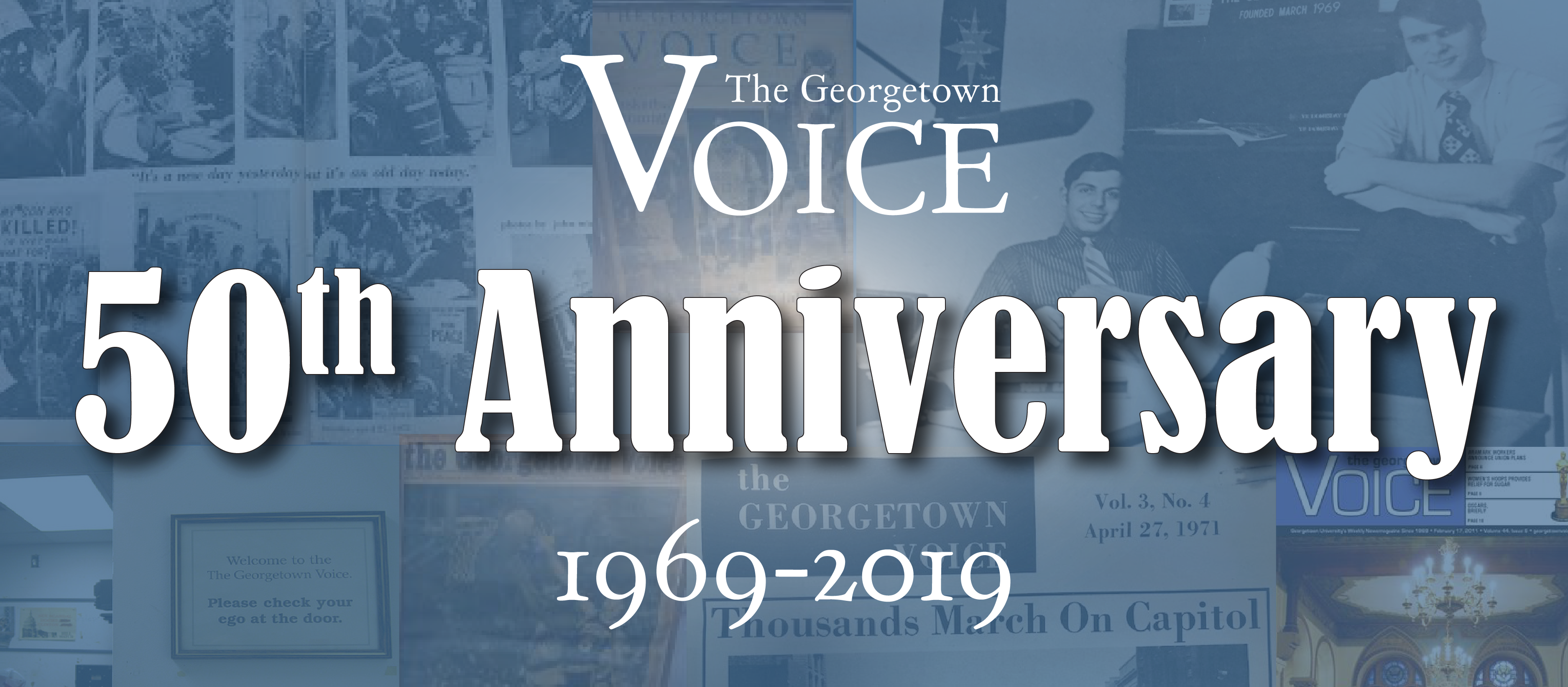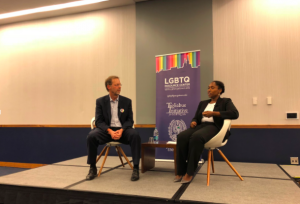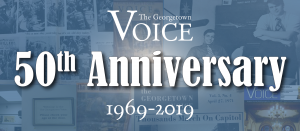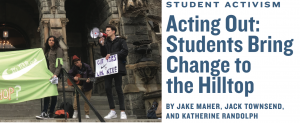The Voice published its first issue on March 4, 1969. To celebrate, we’re re-publishing pieces about previous Voice anniversaries we’ve found in our archives. Happy birthday to the Voice!
By Charles J.X. Kahwaty for the Voice‘s 10th anniversary
Ed Note: The following is an attempt, by one former editor, at a VoiceRetrospective, being an imaginary dialogue between a former “Voicer” and a friend. It takes place, appropriately enough, while rummaging through old newspapers in a basement somewhere in New Jersey, a state to which we all, someday, must return.
Q: What’s this newspaper?
A: The Voice.
Q: The Village Voice? What a minute, it looks kinda skimpy for a paper with a classified.
A: No, Delta House reject. The Georgetown Voice. I worked on it, if you can call it that, when I was in college.
Q: That so? You didn’t strike me as the classroom type anyway. When were you there?
A: From ’72 to ’76.
Q: The period of mellow activism, eh?
A: That sums it up pretty well. The paper started out as an anti-war rag in March 1969, kind of an alternative to the conservatism of The Hoya. But the unofficial line was that a bunch of editors at The Hoya had a personality clash with the Editor-in-Chief of The Hoyas (newspapers, not students) in the Quad. Of course, The Hoya never had a monopoly on in-fighting, we found out later.
Q: What happened with the paper?
A: Well, as I said, the Voicewas an activist paper compared to its comrade-in-libel, printing posters of clenched fists and the like on the back page. The writing was pretty good, too. You might say it was natural later on for a neo-conservative like me.
Q: But you were just a child in high school when the Voicegot under way.
A: But of course, oblivious to the evils of the world.
Q: So when you arrived at Hoyaville—
A: Don’t say that word!
Q: Sorry, I mean G’town.
A: That’s better. When I arrived, I was introduced to a tabloid printed on newsprint—it had been printed on heavy white paper—and was now a weekly.
Q: What were job conditions like?
A: For a non-journalist, you ask a lot of questions. But since you insist—job conditions weren’t bad, just chaotic, like any newspaper. The Voicewas then—still is—housed in that crumbling old infirmary, O’Gara, and more specifically the second floor, which has been in imminent danger for years of becoming the first floor. There were showers that didn’t work, buzzer buttons that summon no one, and sinks with no running water.
Q: Who needs typewriters anyway in a newspaper.
A: Oh yeah, well, the paper ran, surprisingly, only the tone was changing, becoming more featury. We were always big on a magazine-type-lay-out; in fact, we officially became in my las two years a “newsmagazine,” with more emphasis on in-depth stories as opposed to once-overs of the news, which we left to The Hoya.
Q: And what did you do?
A: Features. (Pause.)
Q: I see the bias. You may continue.
A: Much obliged. We tried to reach out and encompass the community, in addition to the campus. We interviewed journalists Ben Bradlee, Dan Rather, and Helen Thomas, diplomatic attaches to the Soviet Union, and even priests who had performed a few exorcisms. Needless to say, the last topic was pretty trendy for a while. One story goes the producers of “The Movie” needed a church to perform a desecration scene. The Archdiocese of Washington gave a flat no, but the good Jebbie fathers of Georgetown, when they head a percentage of the gross might be available…
Q: Dived in, you might say.
A: Of course, that’s just a rumor. Anyway, we would work on the paper all week. That “we” doesn’t include me—I’d start my story the day before it was due. But at least it would be timely. Deadlines for copy, except for a few “holes” reserved for weekend news, were usually the Thursday or Friday before the Tuesday the paper came out. But Polygraphic—that’s what our composers used to be called—often got a glut of copy on Sunday morning. They couldn’t even make brunch at the Marriott, let alone Clyde’s. By the way, we had to walk down those steps next to the Kennedy Institute to get to them. Lots of fun.
Q: So it was printed Sunday.
A: Very astute—for somebody who needed Cliff Notes for Love Story. Actually, we worked all Sunday laying out the paper, sometimes without any pictures or ready copy to work from, trying to put the paper “to bed” around midnight (read: 3 a.m.). Then we polished it up with Polygraphic’s help on Monday and that night we took it to the Record Co. in Silver Spring to be printed the next day. A labor of love.
Q: But that’s so technical. What about the blood and guts, the emotions…
A: So you want gossip. Why must we dwell on sex and sensationalism. More important, where do I begin? When I was there we had a few run-ins with the administration, particularly when we leaked a story a little faster than they could feed it to us. Nobody ever accused usof a conflict-of-interest, even though half of our editorial board worked at some time for public relations. We had a run-in or two with the Student Activities Board when we printed some figures on the revenue earned by the SEC which were a bit off (the new math threw us). And when the paper ran an abortion ad, the emotionalism, and in and out-fighting ran pretty high.
But that wasn’t all. We once got a quote from President Henle (who headed the university before President Healy) to the effect, “I don’t like Jews, I don’t dislike Jews.” Sort of a benign neutrality. We even went to a twice-a-week edition for a while, till we found out our physical, financial, and manpower resources couldn’t cover it. And one Editor-in-Chief was secretly purged by a meeting of editors in a basement apartment lit by a single light. Fellow travelers all, there was even a “smoking gun.” But that’ll have to wait for the book.
Q: The Book?
A: You want a piece of the action?
Q: Not with this plot. How about distinctions?
A: Don’t worry, they’re there. The newspaper won a few awards from a Washington-based business association, has more than a share of the Edward Bunn journalistic awards given each year by the university, has been written about in The New York Times, and has even had humble folks like Eric Sevareid come down from the mountain to attend our get-togethers (in that case, the Voice’s Fifth Anniversary Celebration). Now I hear Art Buckwalf writes a letter-to-the-Editor when he has some free time on his hands.
Q: You’ve mentioned a lot of journalists…
A: Well face it. D.C. is a mutual admiration society, and journalists, if it’s not politicians, are doing a lot of the mutual admiring.
I’ve got to go now; this déjà vu trip is getting to me.
Q: You’re right. Boredom is contagious. Let’s watch Supertrain.
Charles J.X. Kahwaty is presently a third-year student at Seton Hall Law School in New Jersey. He was the editor-in-chief of “Res Ipsa Loquitas,” Seton Hall’s student newspaper (which, surprisingly resembles The Georgetown Voice!) Kahwaty recently won two Awards for Excellence in the 1977-78 Newspaper Contest of the Law Student Division of the American Bar Association. He is also on the Seton Hall Law Review.





